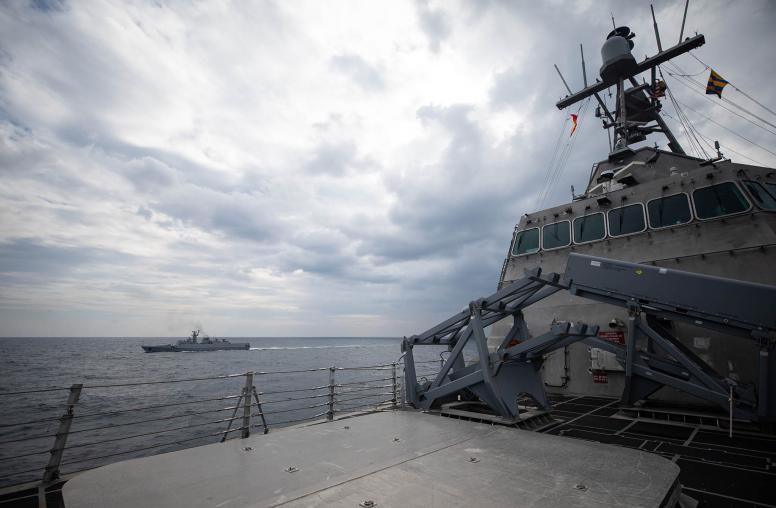The Moro Islamic Liberation Front (MILF) and Security in Southeast Asia
Zachary Abuza, Senior Fellow
Senior Fellow Zachary Abuza noted that the Moro Islamic Liberation Front (MILF) has waged a secessionist campaign in the southern Philippines since 1978, when they broke away from the secular Moro National Liberation Front (MNLF). Their avowed goal is to establish an independent homeland for the Moro peoples that will be governed by sharia (Islamic law). Though initially armed and supported by the Libyan and Malaysian governments, by the early 1990s, the MILF had lost much of its state support. To that end, the MILF forged a tentative relationship with Al Qaeda, receiving money through Saudi charities, as well as limited military training, though while trying to build up its self reliance. While they always remained focused on the “near enemy” and the establishment of their own homeland, they were willing to take advantage of the support that transnational groups offered them; in exchange, they had to give some assistance to groups, such as Al Qaeda’s regional affiliate, Jemaah Islamiyah (JI), in pursuance of the war against the “far enemy.” While the MILF is not a transnational group that seeks to establish a pan-Islamic caliphate (known in Southeast Asia as Nusantara Raya), they have given assistance to groups such as JI and the Abu Sayyaf group (ASG).

Map of the Philippines
(Courtesy: University of Texas)
Since 2002, the JI, arguably the most lethal of all of Al Qaeda’s regional affiliates, has perpetrated three deadly bombings in Indonesia—in Bali (October 2002), the JW Marriott in Jakarta (August 2003) and at the Australian Embassy (September 2004). Despite the MILF’s denial of ties to JI, credible evidence soon emerged that several JI members involved in the three bombings were trained in MILF camps. The MILF has thus become a potential threat to security in Southeast Asia and is left with very few defenders, especially in the U.S. government.
Abuza argued that these developments have important consequences for the ongoing peace negotiations between the Government of the Republic of the Philippines (GRP) and the MILF. So far the talks have yet to demonstrate substantial success. The MILF’s lack of military strength—not to mention other resources—will likely keep them involved indefinitely. But the GRP has used the peace process as a tool to fragment and sow dissension within the ranks of the MILF. If there is any hope of a breakthrough in these talks, the GRP will need to become more sincere and effectual—unlikely in light of the current scandals surrounding Philippine President Gloria Macapagal-Arroyo. The situation is further exacerbated by growing support for the idea among U.S. policymakers of including the MILF on the State Department's list of foreign terrorist organizations. Such a move would seriously hamper the negotiations, according to Abuza.
The MILF ultimate goal is to establish a Muslim-dominated independent state while expanding the territory. Abuza pointed out that this objective is likely to shift as a new generation of MILF leaders emerges. JI and ASG have already created a new generation of jihadi extremists—there is every risk that they will either infiltrate the MILF or form alliances with hard-line members of the MILF who are skeptical of the peace process. This would not only undermine the legitimacy of the MILF, but could prepare the ground for potential sectarian violence among Christians and Muslims in the south.
In summary, Abuza observed that a successful peace process is crucial for both the GRP and the MILF. If the peace process fails to proceed, he argued, not only will the conflict endure but also the MILF will become more radical. As a result, this will pose a threat to regional security and make it even more difficult for the GRP to address the problems of the south. In addition, the MILF’s credibility with its rank and file will be undermined, especially with the new generation's members who are already impatient with the MILF's failure to bring its promise to reality. On the other hand, if the peace process is successfully implemented, the MILF must be poised to confront potential factions in the organization and effectively police their territory.
Zachary Abuza is associate professor of political science at Simmons College in Boston. A leading specialist in Southeast Asian security issues and militant Islam, he has published more than one dozen articles in top area studies journals, including Asian Survey, Contemporary Southeast Asia, and Harvard Asia Quarterly. Abuza frequently lectures on Southeast Asian politics at the Department of State's Foreign Service Institute and briefs various U.S. government agencies on Southeast Asian politics and security issues.




